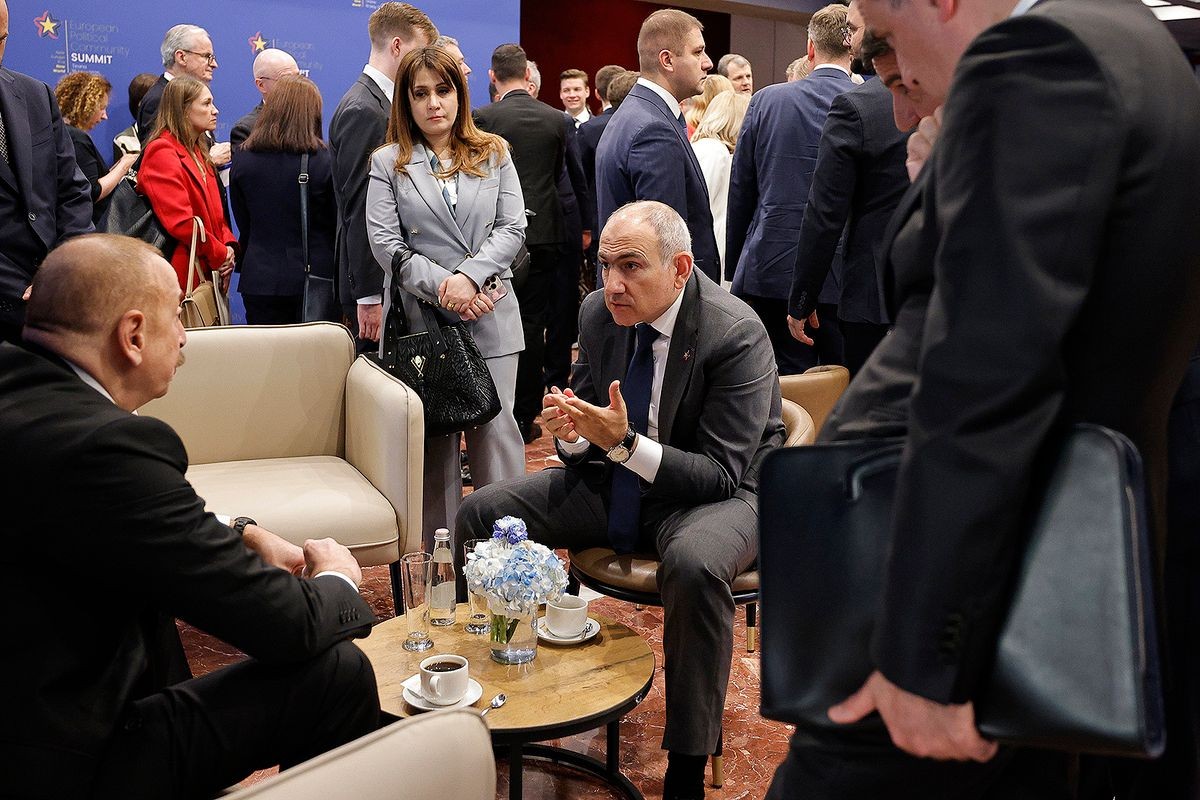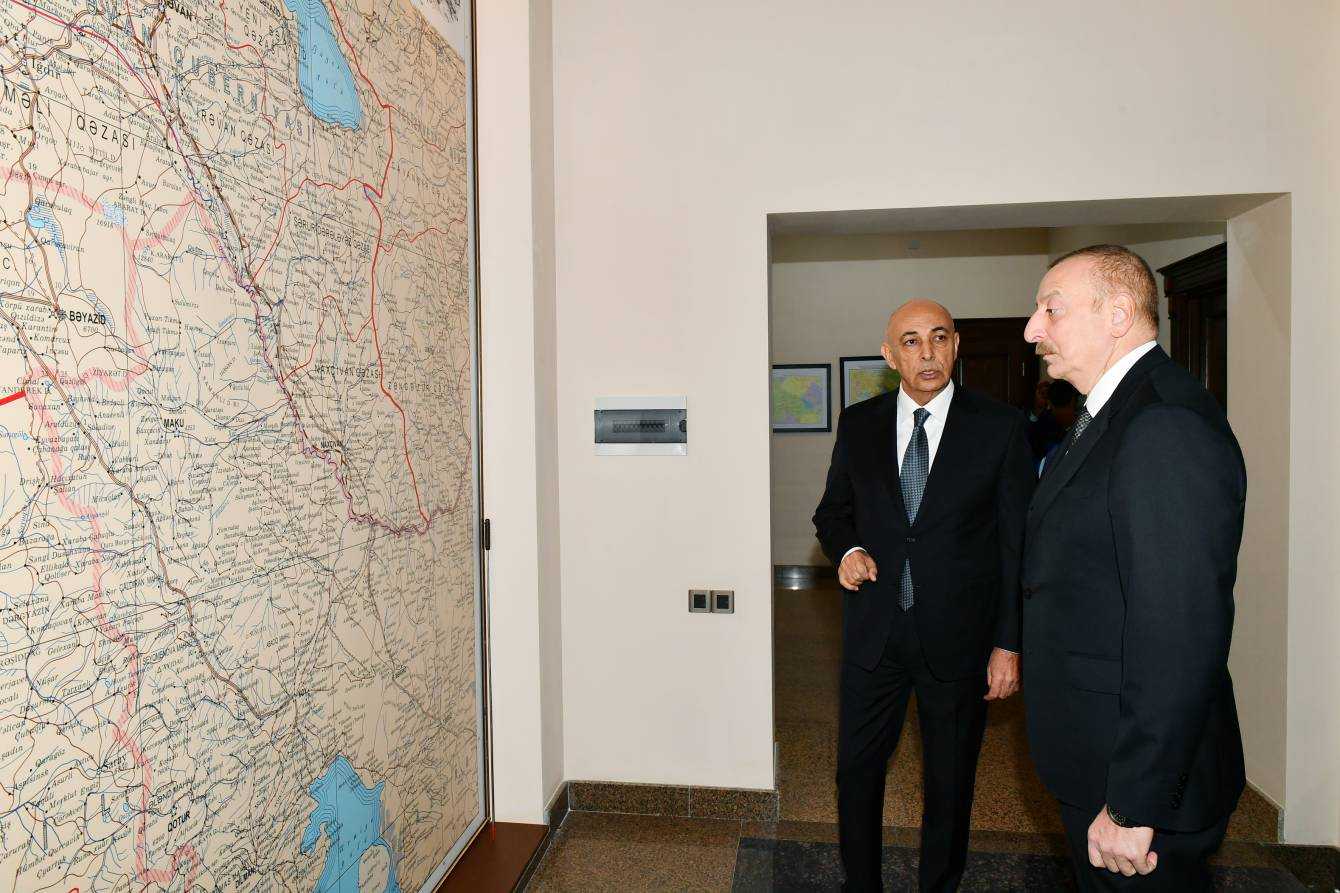
On 16 May, Armenian Prime Minister Nikol Pashinyan and Azerbaijani President Ilham Aliyev met on the sidelines of the European Political Community summit in Tirana. The same day saw renewed high-profile calls for signing the peace treaty, which has remained unsigned since the two sides agreed on its terms in March.
According to official Armenian statements, Pashinyan and Aliyev discussed the ongoing peace process during their meeting.
‘The parties discussed the current situation and attached importance to the continuity of the process towards its signing’, the statement read.
A video less than a minute long, shared by Pashinyan’s office, showed Pashinyan and Aliyev chatting around a coffee table, later joined by their delegations, including foreign ministers Ararat Mirzoyan and Jeyhun Bayramov.
On the same day a video surfaced online capturing Pashinyan’s original invitation to Aliyev, in Russian, to join him for a coffee on the sidelines of the summit, to which Aliyev responded that he would join after talks with his colleagues.
This marked the first meeting between Pashinyan and Aliyev since the text of the peace treaty was agreed upon on 13 March after lengthy negotiations. The treaty has remained unsigned, with Azerbaijan pushing preconditions.
Although progress was apparently made on the diplomatic front after the two countries agreed on the text of the peace treaty, tensions continued to mount on their shared border.
Just three days after announcing that they had reached an agreement, Azerbaijan issued its first statement accusing Armenia of ceasefire violations along the border. Since then, Azerbaijan has made nearly 30 such accusations, all of which Armenia has dismissed.
In turn, Armenia has six times accused Azerbaijan of targeting civilian infrastructure in border villages, releasing statements accompanied by photos showing damage caused by gunfire, along with bullet fragments.
Also in Tirana, Pashinyan and Turkish President Recep Tayyip Erdoğan held a brief meeting, which Aliyev later joined at Erdoğan’s invitation.
RFE/RL reported that the meeting with Erdoğan took place after the bilateral talks between the leaders of Armenia and Azerbaijan.
Calls for a swift signing of the peace treaty
During his time in Tirana, Pashinyan also met with several other high-profile officials from the EU, who renewed calls for a swift peace agreement between Armenia and Azerbaijan.
Pashinyan held talks with several foreign counterparts, including French President Emmanuel Macron. Macron wrote on X that the normalisation of relations between Armenia and Azerbaijan ‘is essential for the stability of the region’. He also expressed his ‘full support to Armenia, its integrity, and its territorial sovereignty’.
With Prime Minister @NikolPashinyan, at the European Political Community Summit in Albania.
— Emmanuel Macron (@EmmanuelMacron) May 16, 2025
I reiterated my support for the swift signing of a peace treaty with Azerbaijan.
The normalization of relations between Armenia and Azerbaijan… pic.twitter.com/2YLAimmvWK
According to Armenian news agency Armenpress, at the same summit, Macron addressed Pashinyan and Aliyev, saying that ‘we fully support you on the path toward signing’ the peace treaty.
He also expressed his belief ‘that everything between Armenia and Azerbaijan will conclude with the signing of a peace agreement’.
Pashinyan also met with the EU’s top diplomat Kaja Kallas, and held a joint meeting with EU Council President António Costa and EU Commission President Ursula von der Leyen.
Later, von der Leyen, sharing the photos of her separate meetings with Pashinyan and Aliyev, wrote on X that she and Costa were ‘looking forward’ to the swift signing of a peace treaty between Armenia and Azerbaijan.
She also expressed the EU’s readiness ‘to invest in regional connectivity — and bring the whole region closer together and closer to our Union’.
.@eucopresident and I congratulated the leaders of Armenia and Azerbaijan on the finalisation of the peace treaty.
— Ursula von der Leyen (@vonderleyen) May 16, 2025
It’s a major step forward. And we're looking forward to its swift signature.
The EU is ready to invest in regional connectivity – and bring the whole region… pic.twitter.com/bIVaCSCw8y
In turn, Kallas reportedly told journalists that it was ‘in everybody’s interest’ that Armenia and Azerbaijan sign a peace treaty, ‘so that we have [one less] conflict’.
‘I was in Azerbaijan, and I’m also going to Armenia. It’s important to take the tensions down in this region’, Kallas said.
While Azerbaijani pro-government media have not reported about the meeting between Pashinyan and Aliyev, Pashinyan was featured in a compilation of meetings Aliyev held talks with in Tirana in a video on X.
However, Report later stated that during a visit to Iran afterwards, Azerbaijani presidential aide Hikmat Hajiyev, who also participated in the Tiran conference,told the Iranian Tasnim News Agency that ‘Azerbaijan can say with satisfaction that since Azerbaijan and Armenia gained independence, ideal conditions for peace in the region have been created today’.
‘We can even say that de facto peace and stability reign in the region. Azerbaijan will do everything in its power to give this a legal framework so that complete and final peace is established in the region,’ Hajiyev said during the interview.
Following the calls for the signing of the peace treaty in Albania, on 17 May in Tehran during a meeting with Armenian Secretary of the Security Council Armen Grigoryan, Iran’s Foreign Minister Abbas Araghchi also called for the swift signing the agreement between Armenia and Azerbaijan, the Iranian state news agency IRNA reported.
Araghchi added that Iran believes that the peace agreement would improve regional stability and security.
Following these developments, on Monday, the Russian state-run agency TASS quoted Collective Security Treaty Organisation (CSTO) Secretary General Imangali Tasmagambetov as expressing hope ‘for the earliest possible signing’ of the peace treaty. Tasmagambetov added that they expect that ‘its implementation will pave the way for peace and stability in the South Caucasus’.










